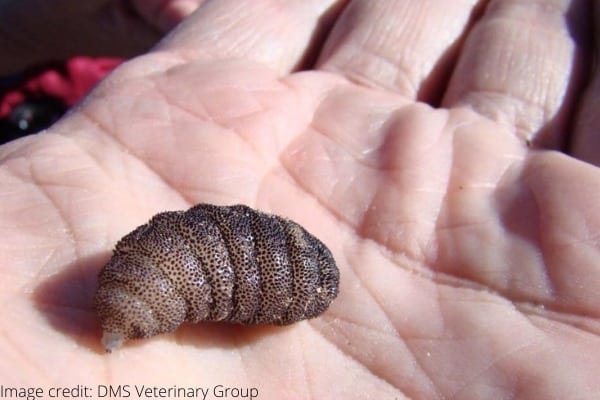
So, what exactly is happening? Picture this: a rodent family goes about its daily life, unaware that they’re hosting tiny worms inside them. The wolf worm larvae burrow into the skin of their hosts, causing discomfort and sometimes severe health issues. If you’re like most people, you might be wondering how to handle this unpleasant situation. Let’s chat about some practical control tips to manage wolf worm larvae in rodent colonies, keeping both your home and furry friends safe.
Understanding Wolf Worm Larvae
To tackle a problem, you first need to understand it. Wolf worm larvae, also known as *Cuterebra*, develop inside the bodies of rodents after they become infected through contact with eggs laid by adult botflies. When the larvae hatch, they enter the rodent’s skin, often causing swelling and infections. If you’ve ever seen a small lump or sore on a rodent, that could be a sign of wolf worm larvae at work.
You might be wondering how this all connects to you. If rodents are nesting around your home, they can serve as hosts for these larvae. Not only can this lead to sick rodents, but it can also encourage a larger infestation, making the problem even worse. Addressing the source and understanding how these critters operate is key to effective management.
Signs of Infestation
Recognizing a wolf worm larvae issue early can save you a lot of trouble down the line. Here are some common signs that might indicate you have rodents with these pesky larvae:
- Visible Lumps: If you see lumps on the skin of rodents, especially in areas like the neck or behind the ears, this could be the larvae.
- Unusual Behavior: Rodents might exhibit signs of discomfort, such as scratching or biting at their skin.
- Hair Loss: Affected areas may lose fur due to irritation and scratching.
- Signs of Distress: You may notice lethargy or difficulty in mobility if the infestation is severe.
If you start noticing these signs, it’s crucial to act quickly. The longer the larvae stay in their host, the more serious the health risks become.
Preventing Rodents in Your Home
Now that we understand wolf worm larvae and how they involve rodents, let’s discuss prevention. The best way to deal with a potential infestation is to avoid attracting rodents in the first place. Here are some effective tips:
- Seal Entry Points: Check your home for any gaps, cracks, or holes where rodents could enter. Use materials like steel wool or caulk to seal these entry points.
- Proper Food Storage: Keep food in airtight containers, and don’t leave pet food out overnight. A well-fed rodent is a happy rodent, and you want to avoid that.
- Maintain Clean Spaces: Regularly clean your home, especially areas like kitchens and basements, to avoid nesting sites.
- Yard Maintenance: Trim back bushes and remove debris, as these can create perfect hiding spots for rodents.
Taking these steps helps make your home less inviting to rodents, reducing the chances of wolf worm larvae making themselves at home.
Rodent Control Methods
If prevention doesn’t cut it and you’ve already got rodents around, it’s time to look into control methods. Here are some options to consider:
- Traps: Use snap traps or humane traps to catch rodents. Place them in areas where you’ve seen droppings or signs of activity.
- Natural Deterrents: Sprinkling peppermint oil or using ultrasonic repellents can deter rodents without harming them. They dislike strong smells!
- Professional Extermination: If the problem escalates, hiring a pest control professional can provide targeted solutions.
- Monitoring: After taking action, keep an eye out for signs of rodent activity, so you know if your methods are working.
Control methods vary in effectiveness, so you might need to try a combination to see what works best for your situation.
Treating Infected Rodents
If you find that your rodents are already infected with wolf worm larvae, it’s important to act swiftly. Here’s how to handle this situation:
1. Isolation: First, separate the infected rodent from others to prevent the larvae from spreading. This helps contain the issue.
2. Veterinary Care: Find a qualified veterinarian who has experience treating rodent infestations. They may need to remove the larvae surgically or provide medication to combat infections.
3. Post-Care Treatment: After treatment, monitor the rodent’s recovery closely. Ensure it’s being kept in a clean and stress-free environment.
4. Prevent Recurrence: Implement prevention strategies again, as infected rodents can still carry eggs or introduce new larvae to unsuspecting mates.
Remember, the health of the rodents in your care is paramount. Always seek professional advice for the best treatment methods.
Long-Term Management Strategies
Managing wolf worm larvae isn’t just about putting out fires—it’s about long-term strategies. Here are some practices to consider for ongoing management:
- Regular Inspections: Make it a habit to routinely check your property for signs of rodent activity and areas that need extra attention.
- Community Involvement: If rodents are a bigger issue in your area, consider talking to neighbors and community members. Sometimes, a neighborhood approach can make a significant difference.
- Education: Stay informed about the habits of local rodent populations. The more you know, the better you’ll be able to prevent infestations.
- Ongoing Prevention: Continue to use prevention strategies over time. Regular cleaning, sealing entry points, and food storage practices keep you one step ahead.
By being proactive and regularly addressing the problem, you can keep wolf worm larvae and their rodent hosts at bay.
Understanding and managing wolf worm larvae in rodent colonies can seem overwhelming at first, but with the right knowledge and a bit of effort, it’s completely achievable. Start with prevention, stay vigilant, and don’t hesitate to seek help if needed. Remember, a clean and well-maintained environment is your best ally against these pesky pests. By taking these steps, you can help ensure that both your home and the little critters roaming near it stay healthy and happy. Happy pest management!
